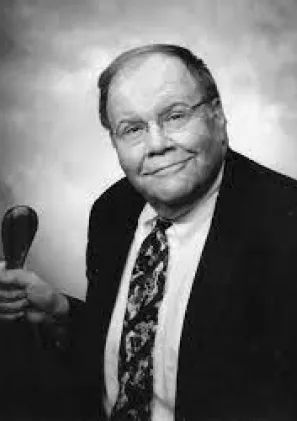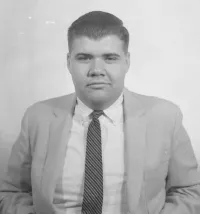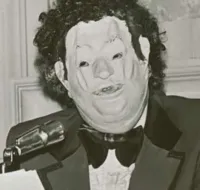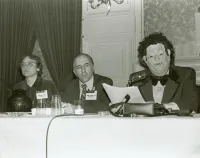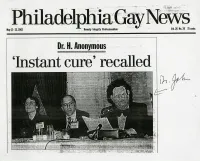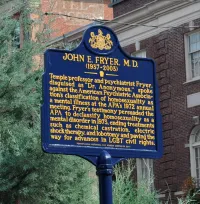Biography
1937 - 2003
“I am a homosexual. I am a psychiatrist … I am in disguise tonight in order that I might speak freely, without conjuring up too much regard on your part about the particular who whom I happen to be. I do that mostly for your own protection.”
– Dr. John Fryer
Dr. John Fryer, who was already in the second grade by age five and graduated from high school at age 15, turned heads at the 1972 American Psychiatric Association (APA) annual conference when he anonymously announced that he was gay. Wearing a rubber face mask and wig over his head, a three-sizes too big suit and using the name Dr. Henry Anonymous, Fryer made that declaration while speaking on a panel called “Psychiatry: Friend or Foe to the Homosexual? A Dialogue” alongside Frank Kameny and Barbara Gittings. The catalyst for this moment came after protests at the 1970 and 1971 APA annual conferences. At the 1972 conference, activists from the APA Gay Liberation and the Radical Caucuses seized the mics and demanded that homosexuality be removed from the list of mental illnesses in the organization’s Diagnostic and Statistical Manual of Mental Disorders (DSM). This mental illness classification had been in effect since 1952. Fryer wore that mask at the 1972 conference because he was on the faculty of Temple University but did not have tenure so he could be fired for any reason. He knew this because it had already happened to him. He had already lost his residency at the University of Pennsylvania. During Fryer’s 10-minute speech he called on other queer psychiatrists in the room to “attempt to change the attitudes of both homosexuals and heterosexuals toward homosexuality.” He got a standing ovation after his speech. Fryer told an interviewer in 2002 that a Friends Hospital administrator was in the audience and applauded his anonymous speech and then a year later that same man fired him from his staff position at the hospital not knowing they were the same man. That administrator told Fryer that “If you were gay and not flamboyant, we would keep you. If you were flamboyant and not gay, we would keep you. But since you are both gay and flamboyant, we cannot keep you.” Fryer and many other LGBTQ activists were successful with their efforts because in 1973 the APA Board of Trustees voted to remove homosexuality from the DSM’s list of psychological disorders. It would take until 1993 for Fryer to come out as Dr. Anonymous in an APA journal article. Fryer specialized in the treatment of drug and alcohol addiction, death and bereavement issues and in later years, helped people who were dying of HIV. He received a Distinguished Alumnus Award from his alma mater, Vanderbilt University and a Distinguished Service Award from the Association of LGBTQ Psychiatrists in 2002. Fryer died in 2003 of gastrointestinal bleeding and aspiration pneumonia. Due to Fryer’s noteworthy accomplishments, the APA created the John E. Fryer, M.D. Award in 2003 in his honor. The first two recipients of this award were Kameny and Gittings. An historical marker has been erected in Philadelphia’s Gayborhood (which Fryer called home for many years) and his home for 31 years in that city was put on the Philadelphia Register of Historic Places.
1937 - 2003
“I am a homosexual. I am a psychiatrist … I am in disguise tonight in order that I might speak freely, without conjuring up too much regard on your part about the particular who whom I happen to be. I do that mostly for your own protection.”
– Dr. John Fryer
Dr. John Fryer, who was already in the second grade by age five and graduated from high school at age 15, turned heads at the 1972 American Psychiatric Association (APA) annual conference when he anonymously announced that he was gay. Wearing a rubber face mask and wig over his head, a three-sizes too big suit and using the name Dr. Henry Anonymous, Fryer made that declaration while speaking on a panel called “Psychiatry: Friend or Foe to the Homosexual? A Dialogue” alongside Frank Kameny and Barbara Gittings. The catalyst for this moment came after protests at the 1970 and 1971 APA annual conferences. At the 1972 conference, activists from the APA Gay Liberation and the Radical Caucuses seized the mics and demanded that homosexuality be removed from the list of mental illnesses in the organization’s Diagnostic and Statistical Manual of Mental Disorders (DSM). This mental illness classification had been in effect since 1952. Fryer wore that mask at the 1972 conference because he was on the faculty of Temple University but did not have tenure so he could be fired for any reason. He knew this because it had already happened to him. He had already lost his residency at the University of Pennsylvania. During Fryer’s 10-minute speech he called on other queer psychiatrists in the room to “attempt to change the attitudes of both homosexuals and heterosexuals toward homosexuality.” He got a standing ovation after his speech. Fryer told an interviewer in 2002 that a Friends Hospital administrator was in the audience and applauded his anonymous speech and then a year later that same man fired him from his staff position at the hospital not knowing they were the same man. That administrator told Fryer that “If you were gay and not flamboyant, we would keep you. If you were flamboyant and not gay, we would keep you. But since you are both gay and flamboyant, we cannot keep you.” Fryer and many other LGBTQ activists were successful with their efforts because in 1973 the APA Board of Trustees voted to remove homosexuality from the DSM’s list of psychological disorders. It would take until 1993 for Fryer to come out as Dr. Anonymous in an APA journal article. Fryer specialized in the treatment of drug and alcohol addiction, death and bereavement issues and in later years, helped people who were dying of HIV. He received a Distinguished Alumnus Award from his alma mater, Vanderbilt University and a Distinguished Service Award from the Association of LGBTQ Psychiatrists in 2002. Fryer died in 2003 of gastrointestinal bleeding and aspiration pneumonia. Due to Fryer’s noteworthy accomplishments, the APA created the John E. Fryer, M.D. Award in 2003 in his honor. The first two recipients of this award were Kameny and Gittings. An historical marker has been erected in Philadelphia’s Gayborhood (which Fryer called home for many years) and his home for 31 years in that city was put on the Philadelphia Register of Historic Places.
Demography
Demography
Gender Male
Sexual Orientation Gay
Gender Identity Cisgender
Ethnicity Caucasian/White
Nations Affiliated United States
Era/Epoch Information Age (1970-present) Post-Stonewall Era (1974-1980)
Field(s) of Contribution
Advocacy & Activism
Education
Medicine
Music
Social Justice
US History
Commemorations & Honors
Vanderbilt University Distinguished Alumnus Awardee (2002)
Association of Gay and Lesbian Psychiatrists, now the Association of LGBTQ Psychiatrists Distinguished Service Awardee (2002)
Association of Gay and Lesbian Psychiatrists, Along with the American Psychiatric Association, Endowed the APA "John E. Fryer, M.D. Award" in his Memory (2003)
Dr. John E. Fryer Historical Marker Erected on Thirteenth Street at Locust Street in Philadelphia, Pennsylvania (2017)
Fryer’s House Added to the Philadelphia Register of Historic Places (2022)
Demography
Gender Male
Sexual Orientation Gay
Gender Identity Cisgender
Ethnicity Caucasian/White
Nations Affiliated United States
Era/Epoch Information Age (1970-present) Post-Stonewall Era (1974-1980)
Field(s) of Contribution
Advocacy & Activism
Education
Medicine
Music
Social Justice
US History
Commemorations & Honors
Vanderbilt University Distinguished Alumnus Awardee (2002)
Association of Gay and Lesbian Psychiatrists, now the Association of LGBTQ Psychiatrists Distinguished Service Awardee (2002)
Association of Gay and Lesbian Psychiatrists, Along with the American Psychiatric Association, Endowed the APA "John E. Fryer, M.D. Award" in his Memory (2003)
Dr. John E. Fryer Historical Marker Erected on Thirteenth Street at Locust Street in Philadelphia, Pennsylvania (2017)
Fryer’s House Added to the Philadelphia Register of Historic Places (2022)
Resources
Resources
Resources
